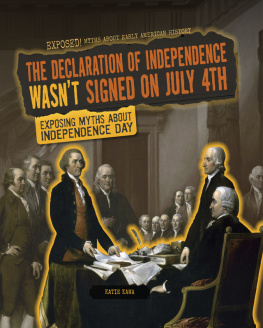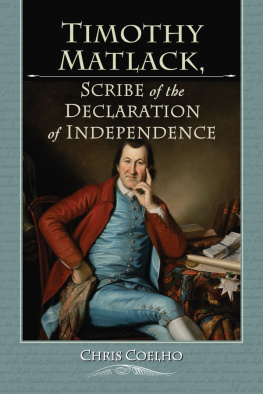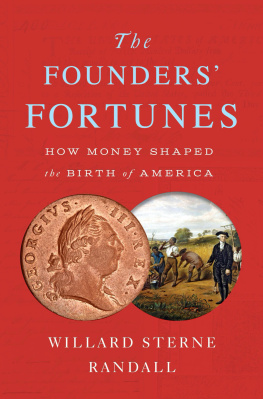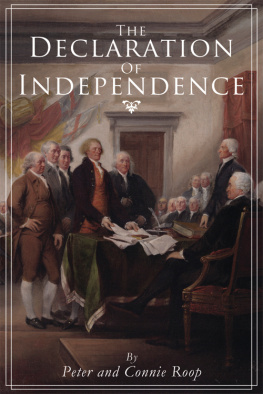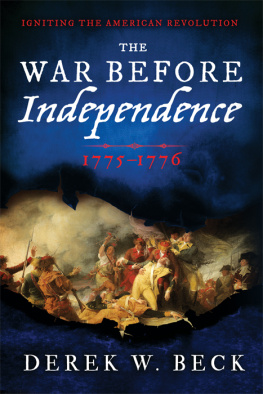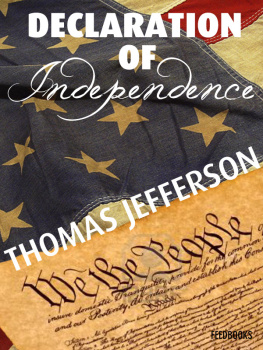OUR LIVES,
OUR FORTUNES
AND OUR SACRED HONOR
ALSO BY RICHARD R. BEEMAN:
Plain, Honest Men: The Making of the American Constitution
The Penguin Guide to the United States Constitution
The Varieties of Political Experience in Eighteenth-Century America
The Evolution of the Southern Backcountry
Patrick Henry: A Biography
The Old Dominion and the New Nation, 17881801
Editor, with Stephen Botein and Edward Carter II:
Beyond Confederation: The Origins of the
American Constitution and National Identity
Series Editor, The Penguin Civic Classics:
The Declaration of Independence and Constitution;
Common Sense; Selected Essays of the Federalist Papers;
Selected Speeches by Abraham Lincoln;
Great American Speeches from the Founding to the Present;
and Major Supreme Court Decisions
OUR LIVES,
OUR FORTUNES
AND OUR SACRED HONOR
THE FORGING of
AMERICAN INDEPENDENCE,
17741776
RICHARD R. BEEMAN
BASIC BOOKS
A MEMBER OF THE PERSEUS BOOKS GROUP
NEW YORK
Copyright 2013 by Richard R. Beeman
Published by Basic Books,
A Member of the Perseus Books Group
All rights reserved. No part of this book may be reproduced in any manner whatsoever without written permission except in the case of brief quotations embodied in critical articles and reviews. For information, address Basic Books, 250 West 57th Street, 15th Floor, New York, NY 10107.
Books published by Basic Books are available at special discounts for bulk purchases in the United States by corporations, institutions, and other organizations. For more information, please contact the Special Markets Department at the Perseus Books Group, 2300 Chestnut Street, Suite 200, Philadelphia, PA 19103, or call (800) 810-4145, ext. 5000, or e-mail special ..
Set in 11.5 point Adobe Caslon Pro by the Perseus Books Group
Library of Congress Cataloging-in-Publication Data
Beeman, Richard R.
Our lives, our fortunes and our sacred honor : the forging of American independence, 17741776 / Richard R. Beeman.
pages cm
Includes bibliographical references and index.
ISBN 978-0-465-03782-7 (e-book) 1. United StatesHistoryRevolution, 17751783. 2. United States. Continental CongressHistory. 3. United StatesPolitics and governmentTo 1775. 4. United StatesPolitics and government17751783. 5. RevolutionariesUnited StatesBiography. 6. United StatesHistoryRevolution, 17751783Biography. 7. StatesmenUnited StatesBiography. I. Title.
E210.B43 2013
10 9 8 7 6 5 4 3 2 1
For Mary
CONTENTS
The Main Players
John Adams: Fiercely intelligent and fiercely opinionated, he took great pride in his reputation as the Atlas of Independence. While many of his fellow delegates no doubt admired his commitment to high principle, on many occasions they must have rolled their eyes at his flights into high dudgeon. Adams was an active participant in the Congress from the moment it first convened and stayed around long enough to serve on the drafting committee of the Declaration of Independence. His ideas and emotions were always on display, and, because he was a compulsive correspondent and diarist, he has left us with the most vivid accounts of the events of the forging of American Independence.
Samuel Adams: The Massachusetts Tory Peter Oliver believed that if an artist wished to draw the Picture of the Devil... he would get Sam Adams to sit for him. British officials in the Bay Colony and in London believed that John Adamss older second cousin was capable of turning the minds of the vulgar... into any course that he might chuse. When Sam Adams appeared at the First Continental Congress in September 1774, he surprised the delegates by his somber, logical exegesis on the imperial crisis. The interplay between Sam and John Adams at the Continental Congress had some fascinating twists and turns, with Sam, not John, more often recognizing the importance of gently persuading, rather than badgering, the more reluctant colonies to embrace the decision for independence.
John Dickinson: When he took his seat in the Continental Congress as a delegate from Pennsylvania in October of 1774, Dickinson, along with Bostons Sam Adams, was probably the most well-known defender of American liberty. Dickinson earned that reputation not by his radical activism on the streets of his city, but by the power of his intellect. At the heart of Dickinsons defense was his devout belief in what he called the principles of the true English constitution. It was that devotion to finding a path toward reconciliation with Great Britain that would set Dickinson and John Adams on opposing courses. When George III failed to change his policies, Dickinson continued to plea for conciliation, delivering a heartrending speech in the Congress on July 1, 1776, opposing independence. Although he voted against independence and refused to sign the Declaration, he remained a steadfast American patriot, joining the Pennsylvania militia as a brigadier general.
Thomas Jefferson: Next to George Washington, there is no actor in the drama of independence more familiar to Americans. But in September 1774, Thomas Jefferson was still a young, relatively little-known member of the Virginia House of Burgesses. He was not one of the key political powers either in America or even in his home colony of Virginia. He was not elected to serve in the First Continental Congress, and only turned up at the Second Continental Congress in June 1775, elected as an alternate, two months after it had convened. The story of how Jefferson, neither an effective orator nor a political heavyweight in a colony replete with prestigious politicians, became the primary author of the Declaration of Independence, is a fascinating combination of intellectual skill, political maneuvering, and fortunate timing.
King George III: He was not the devil or the tyrant that the American revolutionaries of 1776 made him out to be. Nor was he the incompetent, bumbling, and possibly mentally unstable king portrayed in subsequent histories of the American Revolution. The earnest, modestly intelligent, and somewhat shy and insecure twenty-two-year-old George inherited an enormous responsibility at the death of his grandfather, King George II, in October of 1760. Although George II had often been content to leave matters of imperial policy to his chief ministers in Parliament, his grandson played a more active role in attempting to mediate among the oft-conflicting views of his ministers. By December of 1775, as Americans were becoming more emphatic in denying Parliaments authority over their affairs, the one person whose decisions were capable of producing either reconciliation or revolution was King George III.
Thomas Paine: Born the son of a poor Quaker corset-maker in Thetford, England, he first set foot on American soil on November 30, 1774. (In fact, he may not have actually had his feet on the ground that day, as he was so sickened by the voyage, he had to be carried off his ship and taken to a nearby boardinghouse.) With a modest letter of recommendation from Benjamin Franklin, he soon secured employment as a journeyman writer for
Next page

